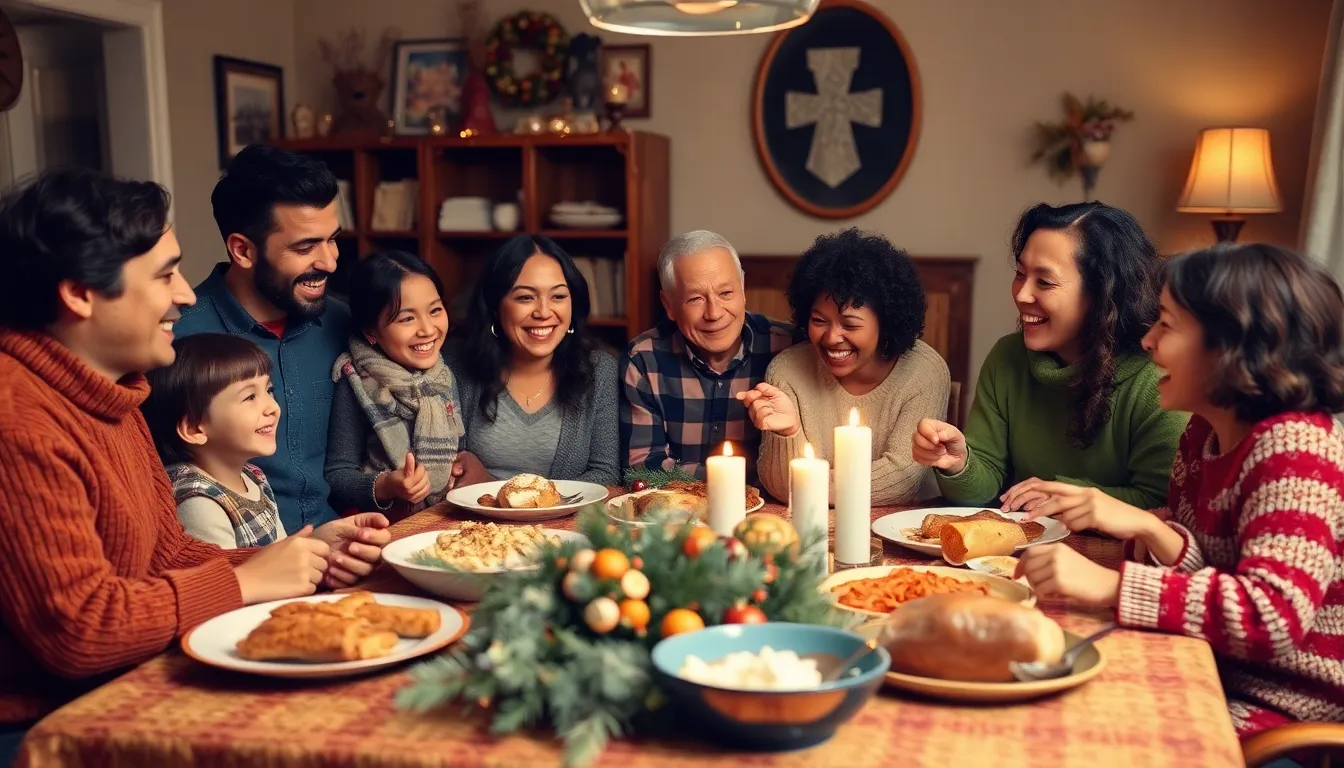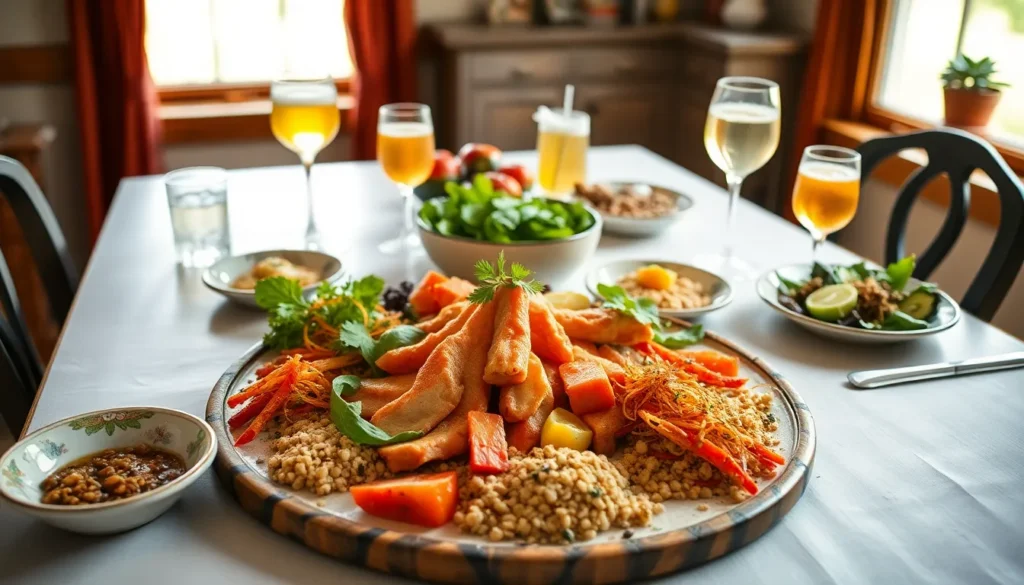Table of Contents
ToggleThe holiday season is more than just a time for twinkling lights and endless feasts; it’s the perfect opportunity to create lasting traditions that’ll have everyone talking for years to come. Imagine gathering around the table, sharing laughter and stories while sipping hot cocoa, all while your family tries to remember the last time Uncle Joe didn’t burn the turkey.
Creating holiday traditions not only strengthens bonds but also adds a sprinkle of magic to the season. Whether it’s a quirky gift exchange, themed movie marathons, or a competitive cookie-baking showdown, these rituals become the glue that holds families together. So why not ditch the ordinary and embrace the extraordinary? Let’s dive into how to craft unique holiday traditions that will leave everyone eagerly anticipating the next celebration.
The Importance of Holiday Traditions
Creating holiday traditions strengthens family connections and fosters a sense of belonging. Unique rituals, like quirky gift exchanges and themed movie marathons, create lasting memories that add joy to celebrations. Engaging in consistent practices enriches the holiday experience and brings individuals together, regardless of age.
Memorable traditions can be as simple as baking cookies on a specific day or volunteering as a family, providing opportunities for togetherness. Rituals also help instill values and cultural heritage in younger generations, teaching them the significance of family unity.
Friends and relatives often cherish their own traditions, leading to the blending of practices that enhance gatherings. Personalized traditions become shared stories that families recount, reinforcing bonds every year. Engaging in such practices creates a framework of stability and familiarity, especially during times of change.
Establishing traditions may invoke anticipation, creating excitement that builds as holidays approach. The joy that comes from participation encourages enthusiasm, making every celebration more meaningful. Moreover, traditions often become a way to honor loved ones who have passed, keeping their memory alive through established practices.
Exploring creative ways to celebrate fosters an atmosphere of inclusion and joy. Intentional planning and thoughtful execution of traditions invite participation from everyone, making previous experiences more vibrant and enjoyable. The uniqueness of each ritual can inspire families to continue evolving their celebrations, ensuring that traditions remain relevant.
Ways to Create Holiday Traditions

Creating holiday traditions involves integrating family and friends into meaningful activities. Engage them in discussions about favorite memories. Sharing ideas fosters inclusivity and strengthens connections. Collaborative planning allows everyone to contribute, ensuring the traditions resonate with diverse experiences. Rotating responsibility for specific traditions keeps enthusiasm high. Enthusiasm grows when families participate openly and share their insights.
Incorporating cultural elements enriches holiday traditions significantly. Celebrating customs provides opportunities to educate younger generations about heritage. At family gatherings, include traditional dishes or practices that reflect cultural backgrounds. Inviting friends to share their traditions offers a broader perspective. Understanding diverse practices deepens appreciation of one another’s backgrounds. Families may also explore local events that highlight cultural significance during holidays. Creating a blend of customs can lead to unique and memorable celebrations.
Creative Ideas for Holiday Traditions
Exploring creative ideas for holiday traditions enhances family connections and adds joy to the season. Here are engaging ways to start new traditions.
Unique Activities to Start
Engaging in unique activities can create lasting memories. Organizing a themed game night encourages interaction and laughter. Hosting an outdoor movie screening builds excitement and anticipation. Families benefit from crafting handmade ornaments, allowing everyone to express creativity. Organizing a “reverse gift exchange” lets family members donate gifts to those in need, fostering a spirit of compassion. Establishing an annual “adventure day,” where families explore local attractions or nature, builds a shared experience. Introducing different cultural celebrations one year at a time broadens understanding of diverse traditions. Each of these activities strengthens family bonds while creating cherished memories.
Recipes and Food Traditions
Food often plays a central role in holiday experiences. Designing a family cookbook preserves cherished recipes for generations. Focus on creating a signature dish that everyone contributes to preparing together. Preparing traditional meals from various cultures introduces new flavors and ideas. Baking treats together, like cookies or pies, becomes an activity that sparks joy and conversation. Incorporating themed food nights allows families to explore global cuisines. Participating in potluck dinners encourages sharing diverse dishes, enriching celebrations. These culinary customs not only nourish but also create lasting connections among family members.
Adapting Traditions Over Time
Traditions evolve as families grow and circumstances change. Responding to these shifts, families can update rituals while maintaining their core essence. Young family members can suggest fresh ideas, ensuring that everyone feels included in the celebrations.
Cultural influences also play a crucial role in shaping holiday practices. Incorporating new cultural elements introduces variety and fosters understanding among family members. Celebrating different customs each year creates awareness and appreciation for various traditions.
As families experience significant life events, traditions may require re-evaluation. Adjusting specific practices, like changing the location of gatherings after a move, helps maintain continuity while adapting to new circumstances. Celebrating memories of loved ones can provide comfort and strengthen bonds, especially in times of loss.
Revising traditions keeps them relevant and engaging. Instead of hosting the same activities every year, families can rotate responsibilities or implement new themes. Fresh approaches, such as different game nights or seasonal activities, can spark excitement and participation.
Engaging family discussions about what traditions resonate most encourages collaboration. Sharing stories about favorite past experiences can guide decisions on which rituals to adapt or retain. When traditions align with the family’s unique values and context, they foster deeper connections.
Ultimately, adapting traditions involves a balance of preserving cherished elements while inviting innovation. Flexibility and creativity ensure that holiday practices remain vibrant and meaningful. As families grow and change, so too will their traditions, enriching their shared experiences during the holiday season.
Creating holiday traditions enriches family life and fosters connections that last a lifetime. These rituals, whether quirky or heartfelt, become the threads that weave families together. As they adapt and evolve, they maintain their significance while inviting new ideas and perspectives.
Engaging everyone in the process ensures that traditions resonate with all family members, creating a sense of belonging and shared joy. By incorporating cultural elements and diverse practices, families can celebrate their heritage while appreciating the richness of each other’s backgrounds.
Ultimately, the memories forged through these traditions become cherished stories that families carry forward, making every holiday season a unique and meaningful experience.




